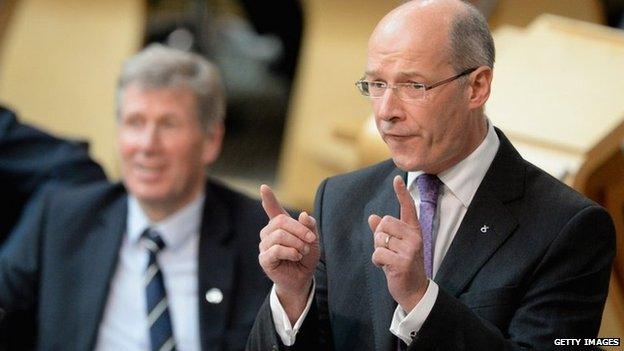Scottish budget: Swinney pledges spending plans to 'boost economy'
- Published

Finance Secretary John Swinney detailed his draft budget for 2014-15 to MSPs at Holyrood
Scotland's finance secretary has set out his spending plans for the next two years, insisting they would boost the economy.
John Swinney said there would be more cash for housing, despite having his overall budget cut by UK ministers.
He also said the SNP government would help mitigate against Westminster welfare reforms.
But the opposition accused him of putting Scotland "on pause" until next autumn's independence referendum.
Speaking in the Scottish Parliament, Mr Swinney said his draft budget, worth about £30bn annually and funded by a Treasury block grant, would also pay for a national performance centre for sport.
And he said the council tax freeze would continue, along with universal benefits like free prescriptions.
Mr Swinney told MSPs the Scottish government's conventional capital budget was being reduced by 26.6%, as UK ministers seek to reduce the nation's spending deficit.
Speaking ahead of the independence referendum, on 18 September 2014, he said: "We have a highly skilled workforce, a long-standing reputation for innovation, a respected and recognisable brand, world-class universities and sectors and companies competing at the highest level across international markets.
"With the full decision-making powers of independence, I should, today, be able to present a budget that puts all of that economic strength to use in building a more prosperous and a more just Scotland.
"Instead, as a result of Westminster's decisions, I must today present a budget constrained by significant cuts."
Mr Swinney said the draft 2014-15 budget, external would:
See affordable housing investment of more than £1.3bn over the four years to 2015-16
Secure total investment of of more than £8bn in infrastructure over the next two years
Invest £24m in 2015-16 on a national sports performance centre to support the legacy of the Glasgow Commonwealth Games
The finance secretary also said UK government welfare cuts would take an estimated £4.5bn out of the Scottish economy.
He announced that £20m would be spent this year to support those struggling with UK-wide housing benefit changes, dubbed the "bedroom tax" by critics.
And Mr Swinney said £68m would be invested in each of the next two years to "limit the damage of Westminster's welfare cuts".
But Labour finance spokesman Iain Gray said the amount of money needed to offset the impact of the "bedroom tax" in Scotland was £50m.
Mr Gray also said a slogan used advance of the announcement - "budget for independence" - had been subsequently dropped by Scottish government spin doctors, adding: "It is a budget for independence - a don't-rock-the-referendum boat budget for a Scotland at a standstill on pause.
"It is the wrong priority."
He asked the finance secretary: "Will he take this budget for independence away and bring back a real budget for jobs and a budget which banishes the bedroom tax from Scotland this year, next year and the year after as well?"
Conservative finance spokesman Gavin Brown said the budget would "penalise" businesses to the tune of almost £450m, under plans to increase the income from business rates from £2.4bn this year to more than £2.8bn in 2015-15.
He said: "Today's budget should have been about the economy - but as far as the economy is concerned, this is a budget that has both under-promised and under-delivered."
Scottish Liberal Democrat leader Willie Rennie said Mr Swinney's budget - which still needs the approval of parliament - was an inadequate response to Scotland's economic needs.
Responding to the draft budget, trade body Homes for Scotland's chief executive, Philip Hogg, welcomed additional spending on housing.
However, he added that recent quarterly figures showed a 25% fall in housing completions across all sectors and starts slumping to their lowest figure on record.
CBI Scotland said the budget contained a number of positive announcements on affordable housing, digital technology and the local carbon economy.
But assistant director David Lonsdale added: "The budget was a missed opportunity to introduce an air route development fund in order to establish more direct links with key overseas business destinations, and to signal a fresh direction on public service reform through contracting-out the delivery of a wider range of public services to the private sector."
- Published11 September 2013
- Published11 September 2013
- Published11 September 2013
- Published3 September 2013